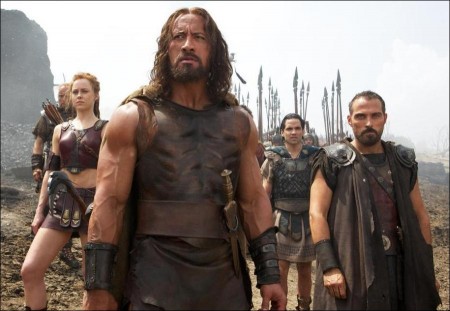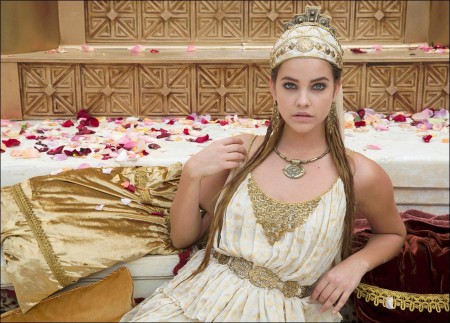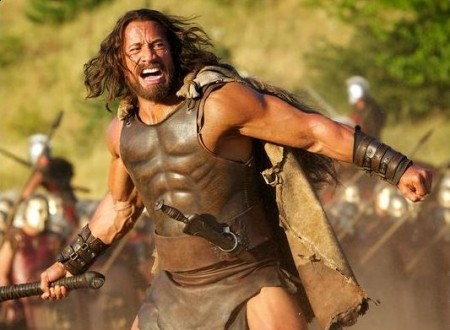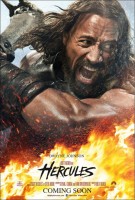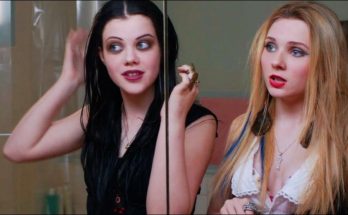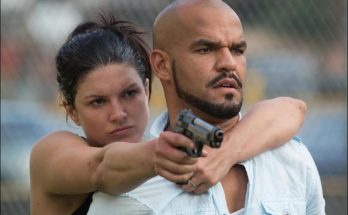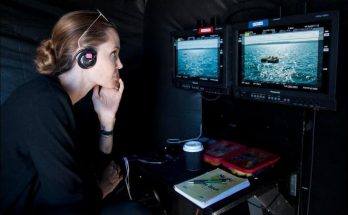Taglines: Before he was a legend, he was a man.
Haunted by a sin from his past, Hercules has become a mercenary. Along with five faithful companions, he travels ancient Greece selling his services for gold and using his legendary reputation to intimidate enemies. But when the benevolent ruler of Thrace and his daughter seek Hercules’ help to defeat a savage and terrifying warlord, Hercules finds that in order for good to triumph and justice to prevail… he must again become the hero he once was… he must embrace his own myth… he must be Hercules.
Hercules is an American adventure film directed by Brett Ratner and starring Dwayne Johnson, Ian McShane, Reece Ritchie, Ingrid Bolsø Berdal, Joseph Fiennes, and John Hurt. It is based on the graphic novel Hercules: The Thracian Wars. Distributed jointly by Paramount Pictures and MGM, it was released on July 25, 2014. It is one of two Hollywood-studio Hercules films released in 2014, the other being Summit Entertainment’s The Legend of Hercules.
An Ageless Myth
The immortal legend of Hercules — the demigod renowned for his mighty deeds and valor – gets a high-adrenaline 21st century makeover as director Brett Ratner and leading action star Dwayne Johnson bring Hercules to life in a modern incarnation … as a man struggling to live up to his own lore in a world of fearsome villainy.
This version of Hercules is an icon who has vanquished lions and hellhounds, and is publicly feared and revered as a super-human champion; but deep within, he remains wounded by tragedy and uncertain of his legacy. Accompanied by five faithful companions, he travels the empire selling his services for gold and using his formidable reputation to intimidate his enemies. But when the benevolent ruler of neighboring Thrace and his daughter seek Hercules’ help to defeat a terrifying warlord, Hercules can no longer skate by on the folklore surrounding him.
He must learn to embrace his own myth and become the hero people believe in. Says Dwayne Johnson: “Making a movie about Hercules has been a passion project of mine for a very, very, very long time. He’s a character who over the centuries has been an inspiration to many, myself included. But this time, we wanted to give audiences a Hercules they’ve never seen before. When we meet Hercules in this movie, he’s an exile suffering with regrets, fighting only for gold. He has to overcome his demons and find his heart to become the man people want him to be.”
“What’s different about our Hercules is that he is a regular man who has disavowed the fact that he’s the son of a Greek god,” adds Brett Ratner. “Every legend starts with a true story and when I read the script based on the graphic novel Hercules – The Thracian Wars, what blew me away is that it was so grounded in a reality you could feel. That’s what I wanted to bring to the screen.”
For Ratner, no stranger to high-octane screen action from the “Rush Hour” series to “X-Men: Last Stand,” , taking on “Hercules” would mean working on his most epic scale yet – but also zeroing in on Hercules’ place in an era of potent anti-heroes. “This is a story full of constant action, humor and kickass battles, which everyone loves seeing. But I hope people will also walk out of the movie feeling the power of Hercules’ belief,” says the director.
The inspiration for re-imagining Hercules began with the Radical Studios comic book series Hercules: The Thracian Wars, in which British comics writer Steve Moore thrilled readers with the story of a self-doubting fallen hero seeking redemption. Even in the earliest stages, Radical co-founders Barry Levine and Jesse Berger hoped the visually ambitious graphic novel would make the leap to the screen – and break the mold of movies based on classic mythology, which are so often steeped in fantasy or even animated.
The graphic novel first spiked the interest of Johnson during a visit to the Radical offices. “Their comic book was a unique take on Hercules that grabbed all of our attention,” recalls the star. “They took all the cool mythologies of Hercules and tweaked them in a way that gave the story a contemporary power. It was a Hercules audiences aren’t yet familiar with.”
Soon after, Ratner joined the project and Radical Comics was thrilled with the synergy. “It turned out that Brett was a Hercules fan from since he was a little kid,” Levine recalls. “He brought in an unbridled enthusiasm and passion, and started coming up with incredible ideas.”
Those ideas merged with the work of screenwriters Ryan Condal and Evan Spiliotopoulos, who put Hercules right in the thick of a volatile time of shifting alliances, military conquests, tribal unrest and imperial ambitions. It’s a world in need of mythic powers, but Hercules isn’t exactly convinced he has them to spare.
“The screenplay deconstructed the myth of Hercules,” Flynn observes. “He has completely rejected the famous legends about himself – and you see that he is someone close to giving up. But he has one last chance to cleanse his demons and become whole again.”
With Johnson cast as Hercules, the screenplay took on new dimensions. “Once Dwayne came aboard, we really started bringing out the fun and charisma of Hercules,” explains Spiliotopoulos. “We wanted the audience to enjoy Dwayne’s humor, his charm, and the thrill of a summer action movie about Hercules.”
Summarizes Johnson: “For me, the tone of ‘Hercules’ had to be right on the money, it had to find that balance between humor, heart, and big, epic action – and I think we were able to do that and ground the story in characters who are a lot of fun. I wanted Hercules to have a cool charm, and to be everything physically that people always imagined he would be.”
Back to B.C.
To bring audiences back to the B.C. era of fabled Greek heroes in an exciting, modern way, Brett Ratner decided early on he would go old school – building epic sets from scratch. In search of the square footage to pull off such a feat, the production journeyed to the Origio Film Studios in Hungary, where “Hercules” would use all seven of their soundstages as well as a vast backlot.
“Brett was adamant from the beginning that he wanted epic, memorable sets,” Beau Flynn recalls, “and shooting in Budapest really allowed us to go for it.”
Adds Ratner: “We were able to create incredible battle sequences on a scale I never dreamed you could shoot, let alone survive, with horses, chariots and hundreds of warriors.”
The experience was often surreal as hundreds of Greek soldiers marched to the set carrying their shields, followed by tattooed, bald Bessi warriors bearing fearsome blades, and then teams of horses pulling chariots. For many, the feeling was of being transported in a time machine.
“Every set was like something out of Cecil B. DeMille, with that kind of scope,” recalls Rufus Sewell. “It makes a big difference to actors because you’re reacting to a real environment.”
Ratner also recruited a crack creative team. “These were all people I had dreamed of working with in the past and I finally had that chance,” says the director.
Heading the team was Ratner’s long-time collaborator, cinematographer Dante Spinotti, a two-time Oscar nominee for “The Insider” and “LA Confidential.” “Dante makes you forget that the camera exists,” says Ratner. “He really invites you into Hercules’ world.”
The duo also worked closely with production designer Jean-Vincent Puzos, who most recently worked with Michael Haneke on the Academy Award-winning “Amour.” “Jean-Vincent and I talked about “Hercules” for over a year before production,” explains Ratner. “He came up with amazing designs that always brought a new and fascinating slant. It was his idea to get away from the classic white marble look — and the dark, textured look he created works so well for our story.”
The centerpiece of Puzos’ design was the Bessi village of Thrace, which becomes the site of a ferocious battle. He had one goal: to make it feel as alive as any neighborhood in the 21st century. We built the houses with wood, stone, and mud,” explains set decorator Tina Jones. “Jean-Vincent wanted it to be gritty and dirty. He wanted you to be able to almost smell how awful it was.”
On a soundstage at Origio Studios, Puzos fabricated another colossal set: Cotys’ courtyard citadel rising like a phoenix, and featuring a magnificent altar to the goddess Hera atop a huge staircase lined with flame-filled braziers. Here, the classical white marble beauty of Hera contrasted dramatically with the grittiness of the rest of the set. “I decided to paint all the wood red. In Greece they used to paint everything in bull’s blood because it is very dense. It connected everything to the primitive feeling that the bull was protecting the people,” says Puzos.
Ratner was gratified by the work of Puzos and his team. “The citadel set looked and felt real, and the audience will feel that when they watch the film,” he says.
The piece de resistance for Puzos was the dungeon set, where Hercules is chained and taunted by King Eurystheus and Cotys. “I think it is the most impressive of all the sets,” he says, “because of the patterns we created with the stones, the fire and the green river of sulfur.”
Jones had a lot of fun with it. “We had cages full of skeletons, an executioner’s block and chains everywhere,” she says. “It takes you to a shocking place.”
Hercules in Battle
Though Brett Ratner is a veteran of high-style modern action, having collaborated closely with Jackie Chan for years, this film would take him into fresh territory. He aimed to create fierce, primal fights that might come out of myth, but feel like they are happening right this moment.
Ratner recruited a formidable team to work with the cast, headed by second unit director Alexander Witt, stunt coordinator Greg Powell and fight coordinator Allan Poppleton, who in turn brought in daring stunt performers from England, Canada, New Zealand, Hungary, Slovakia, and Bulgaria, as well as a group of sensationally skilled horsemen from Spain headed up by Ricardo Cruz Sr.
As soon as Powell read the script, he started thinking about just how enormous Hercules’ strength might be. “He’s not supernatural,” notes Powell, “but he is a big guy, probably twice as big as I am, so if I can throw someone six feet, then he can throw them twelve. I worked on that principle throughout the fight sequences.”
He then began working closely both with Ratner and Johnson to develop Hercules’ distinctive fighting style. Despite having just recovered from surgery, Johnson insisted on doing all his fights himself and immediately started training with the Hercules’ club and hefty sword. “Dwayne is massive, so we incorporated his size and all wrestling skill into Hercules’ style,” explains Poppleton. “He was very hand-on with ideas – for example, coming up with his own methods of using the club.”
“He needed to wield this thing like the back of his hand,” says Johnson of the wooden club Hercules employs with deadly aplomb, “because it has been his weapon of choice over the years.”
Powell and Poppleton worked with the cast for a month prior to shooting. The culmination of all their work would come to a boil in the tricky battle between Hercules, his mercenary band, the Cotys Army and the Bessi warriors who breach the wall and start wreaking total havoc.
“What was unusual is that Brett wanted the Cotys army to be ill-trained in that battle, so that Hercules realizes that he needs to whip them into shape,” Poppleton explains. “At the same time, he wanted the Bessi warriors to be crazy, berserk, almost animalistic kinds of creatures.”
“The Bessis come in strangling, punching, and kicking anyone in sight,” adds Powell, “and our boys did an amazing job there.”
Says Johnson: “The Bessi battle is an epic, epic fight with a unique twist – and it becomes a defining moment for Hercules and his band.”
Throughout filming, the production was able to work with horses that had been carefully trained over many months to fall in battle and other teams trained to haul the chariots driven by Hercules and his band. Four magnificent black Friesians thrilled cast and crew as they pulled Hercules’ chariot, nostrils flaring, manes flying, and shiny black flanks gleaming in the sun.
Driving the chariots was another ancient skill that had to be mastered by cast members – and took 6 weeks of daily training to master the balance. Ian McShane says that it was a unique test. “I ride horses, I love horses, but driving a chariot is something completely different,” he remarks.
Between the chariots and ancient weaponry and graphic choreography, the action was so challenging on “Hercules,” it kept all the actors and stuntmen on their toes. But for Dwayne Johnson, it’s the way Hercules comes to approach his battles that explains his endless appeal. “Hercules might get knocked down, but then he comes back stronger, and that’s a lot like how life is. We all come back after a fall and we come back stronger. We’ve all got a little Hercules in us.”
Hercules
Directed by: Brett Ratner
Starring: Dwayne Johnson, Ian McShane, Ingrid Bolsø Berdal, John Hurt, Rufus Sewell, Aksel Hennie, Rebecca Ferguson, Barbara Palvin
Screenplay by: Ryan Condal, Evan Spiliotopoulos
Production Design by: Jean-Vincent Puzos
Cinematography by: Dante Spinotti
Film Editing by: Mark Helfrich, Julia Wong
Costume Design by: Jany Temime
Set Decoration by: Tina Jones
Music by: Fernando Velázquez, Johannes Vogel
MPAA Rating: PG-13 for epic battle sequences, violence, suggestive comments, brief strong language and partial nudity.
Studio: Metro Goldwyn Mayer, Paramount Picturs
Release Date: July 25th, 2014
Visits: 203
